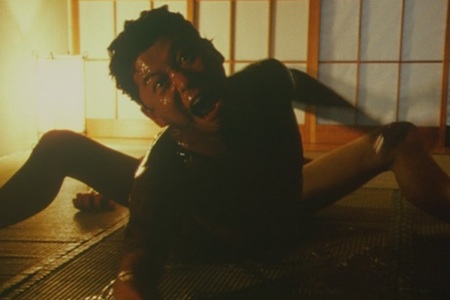
As revelatory as it is revolting, Ichi the Killer is hailed by some as one of the most original action films of our time, depicting moments of mayhem that other movies couldn’t imagine in their worst nightmares. But to call this film original misrepresents a key point—it is actually an adaptation of a Japanese manga by Hideo Yamamoto, one filled from cover to cover with creative acts of violence that are fairly commonplace in Japanese graphic art, but almost inconceivable as live action. That is until Takashi Miike rose to the challenge to bring these crazed visions to the screen, putting his own creativity to the test in pushing cinema to the limits of what it can show and what the audience can endure.
Adapting works from other media is a recurring springboard for Miike’s creative leaps, mutating them into his own unique works. Yakuza: Like a Dragon reworks a highly popular video game, transposing the game’s iconic characters to the screen, and choreographing its battles in game-like fashion. At the same time the movie works against the game’s linear storyline, adding digressions and subplots to weave a multi-player network of chance encounters and outcomes. Miike may take inspiration from the video game, but he’s after more than just a faithful translation to screen.
Video Essay: Takashi Miike’s Mutations
He takes the same approach in directing his first major stage production, Demon Pond. Working on an oversized stage that dwarfs his actors, suggesting a vast space of possibilities, Miike takes this 92-year-old play as a template to mix different elements: traditional Noh and Kabuki theater with improvisation and Western dramatic techniques. He also breaks from his violent habits: unlike his more popular yakuza gangster flicks, there’s just a single act of bloodshed, whose impact registers as profoundly as any violence inflicted in his films. Written by Izumi Kyoka, a 20th-century master of the grotesque and the fantastic, the play is a magical world where sea creatures can talk and conspire against humans and a petulant goddess is a slave to the mortals. Adapting this play may be Miike’s way of linking to Kyoka’s legacy of limitless imagination.
But Miike doesn’t always need existing source material to be creative, though it helps to have a strong script. One of Miike’s best screenwriters, Sakichi Sato, adapted Ichi the Killer and wrote Gozu, one of Miike’s most surreal and hilarious works—the following are spoilers but they only make up half of this menagerie of weirdness. It features a hapless gangster who kills his own boss only to meet him later reincarnated as a woman. He also gets kissed by a cow-headed man, is seduced by a kindly innkeeper who makes her own milk, and runs into Sato himself as a cross-dressing waiter (Sato was also the waiter named Charlie Brown in Kill Bill). It’s a mindbending psychosexual odyssey with the biggest revelation emerging from a pair of designer red panties—the birthplace of Miike’s ultimate mutation, his filmmaking once again renewing itself.
Kevin B. Lee is Editor in Chief of IndieWire’s PressPlay Video Blog, Founding Editor and Video Essayist for Fandor’s Keyframe, and a contributor to Roger Ebert.com. Follow him on Twitter.



